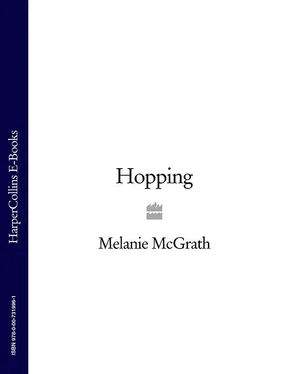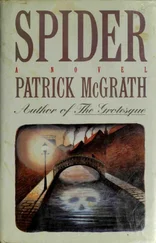Soon Daisy felt the engine begin to slow again and she noticed Mrs Shaunessy fussing with her things. They helped Franny out of the pram and the train came to a halt beside a neat brick and clapboard building decorated with fancy cut-out work. From this hung a sign reading Selling . Billy Shaunessy opened the door, leapt on to the platform and reached back in to receive the hop box and the pram. Once everything was unloaded, Mrs Shaunessy signalled for the children to follow her down the platform. A party swung by laughing wildly and chanting:
Oh, they say hopping’s lousy
I don’t believe it’s true.
We only go down hoppin’
To earn a bob or two,
Oooohhhh, with an ee- aye- o, ee- aye- o, ee- aye- ee- aye- o
Among them, Daisy recognised familiar faces. She was struck by how much smaller everyone looked out here, in this new world. It was as though the countryside had reduced them all to dolls.
Despite all the jollity, or perhaps because of it, Franny was unimpressed with their new surroundings.
I want me dad , she wailed, shuffling in close to her sister. I wanna go ho-ome .
But Daisy knew there was no hope of going home soon. London was an almost infinite distance away, behind endless hills and trees. The air felt thin and cutting, its smell something between river mud and the salted cabbages Jews sold out of barrels. She took in a deep breath, picked up her bag, grabbed her sister’s hand and began to shuffle down the platform towards the station building.
We’re here now, Franny , she said. Let’s make the best of it, eh?
She spotted Mrs Shaunessy up ahead, waving, and they stepped through the station building on to the soft ooze of a cinder path, its give under the feet strangely unsettling, like the grass in Tunnel Park after the river had flooded.
Opposite the station stood a handful of red-brick cottages spread out along a flinty road coloured rosehip pink in the early sun. Up ahead, Mrs Shaunessy was making her way towards a rustic wagon watched over by a solid-looking carter, who wore the kind of thick, crescent-shaped beard Daisy had only seen before on the very old men who lined up outside the Sally Army soup kitchen waiting for food. The carter was directing two nut-brown assistants in billowing shirts as they hoisted hop boxes and suitcases into the wagon, and when that was done, he shouted, Hoi, hoi to his horse and the wagon began to trundle along the flinty road and away.
Mrs Shaunessy took hold of the pram and began striding off after it, and they made their way through the village, which seemed to consist of a single row of modest houses whose red bricks had grown speckled from the salted wind swooping in from marshes a few miles to the north. The houses did not give directly out on to the street as they did in Poplar, but were fronted by neat little plots planted with vegetables and fruit bushes. Everywhere there were trees, leaves clattering alarmingly in the breeze like panicked hoofs on distant cobbles.
Ah, save us , said Mrs Shaunessy, breathing in deep. The cabbagey, empty smell had been replaced now by a thick and tarry aroma. If it ain’t the hops .
Just then the wind blew up again, scattering pieces of straw across the road.
It stinks , shrieked Franny, burying her face in her sister’s coat. I want to go home .
Billy Shaunessy raised his eyes to heaven and kicked a stone.
Listen to Little Miss Muck , Mrs Shaunessy said, not unkindly. Before the week’s out she won’t want to be nowhere else. Ain’t that right, Billy boy?
Billy grunted and kicked another stone.
They passed a road sign reading Neames Forstal and Mrs Shaunessy explained that Selling station wasn’t actually in Selling, but not to worry because everything would become clear.
Pretty soon they had left Neames Forstal behind entirely and were progressing along a deeply rutted road that slid between hedges embroidered with the lace umbrellas of hogweed and pink bladder campions. Others joined them, greeted each other and exchanged gossip. Every so often, when someone she recognised overtook them, Mrs Shaunessy would shout out:
Flossie Felcher, well I never! or Janey Simpson, now don’t you look a picture. You ain’t never had another little ’un! and the two women would look one another up and down, shake their heads over the general state of things and vow to have a good catch-up later on.
After a while, they crossed a footpath that dipped down into a little valley filled with apple orchards, and these in turn gave way to a wood. They could still see the wagon up ahead, the carter slapping his horse from time to time with the reins. The hedgerow here was lined with wildflowers between which danced pretty little blue and brown butterflies.
Look , Franny said, momentarily forgetting her misery to toddle along the bank scooping at the creatures with her hands. Baby birds!
They walked on, past a huge grey house and a cluster of smaller cottages, the most distant of which gave on to fields sprinkled with the cone-hatted houses. Far to the north was the glittering strip of blue Daisy had seen from the train.
They stopped finally, beside a mossy oak gate guarding the entrance to a large grassy field. The carter and his assistants were already unloading the bags and boxes and piling them up on the verge and there were women and children reloading their belongings into wooden wheelbarrows. Beyond the gate, the field rose before them. At its farthest fringe sat a row of whitewashed huts, and outside the huts there were women moving to and fro and children playing. Fires had been lit and some of the women were stirring pots hanging over the flames. Mrs Shaunessy located her hop cart in the melee and was busy pulling it towards the pram, guarded by Billy.
Well, don’t just stand there like a pair of pickles. Get pushing! she said.
They were part-way up the slope when a girl came running down to meet them.
What you doing here, Doze? It was Lilly Seldon. So relieved was Daisy to see her friend that for a moment she thought she might burst into tears.
Lilly took the pram handle and began helping to push.
Daisy said that for some reason to do with the war and her mother, they had come with Mrs Shaunessy. When she’d asked for an explanation, Mrs Shaunessy had placed her finger on the bridge of her nose and shaken her head, saying, Now, now, nosy parker. Curiosity killed the cat .
I suppose your mum’ll fetch you when she gets back, Lilly said.
Daisy looked up, past the huts through the thicket of trees to the cloudless sky above.
I suppose , she said. She looked down at her feet. Talk of her mother sent a pulse of shame through her, then another of guilt for the shame. She knew it was something more than rest her mother needed. Perhaps Billy Shaunessy was right and Elsie was in a dunce hasylum. A leafy stalk had attached itself to her boot and when she bent down to pluck it off, the stem stuck to her fingers. She pushed it away only to have it attach itself to her leg.
Goosegrass, you doze , Lilly said, laughing. She plucked it off between two fingers and flung it into the hedgerow. I’m glad you’ve come .
Like all the other huts, hop hut number 21, about halfway along the field, was put together from rough planks set on to a strip of concrete and roofed in tarpaper. It had a window roughly glazed and a stable door made from whitewashed planks fixed with padlocks, which Mrs Shaunessy was busy unlocking. She passed Daisy a bucket and told Lilly to show her where to fetch water. A queue of children stood noisily beside the single tap serving the huts. As Lilly and Daisy waited their turn, Lilly pointed out the cookhouse, the path leading to the hop gardens and, at some distance away, a shed that served as the privy. When they returned with the water, Mrs Shaunessy handed them each a rag and told them to begin wiping the walls. Inside, it was dark, the air was oddly still and there was a familiar smell of dampness overlying another, earthy aroma. Cobwebs lay across every surface and, as they scrubbed, huge spiders, evicted from their homes, scuttled away into the darker corners. While they worked, Mrs Shaunessy laid a piece of lino on the mud floor. That done, she began hanging pots and cups on hooks and stringing a makeshift curtain at the window, instructing Daisy and Lilly to busy themselves stuffing a palliasse with straw from a bale left outside the hut. Pretty soon, a man with a lazy eye and a squint and a plump, homely-looking woman arrived. It seemed that the man was Mrs Shaunessy’s brother, Alfie, and the woman, Joan, was his wife. Later, an old woman with metal hair rollers and a witchy-looking goitre fetched up and sat herself down on a sawn-up log outside the hop hut next door. This was Nell, with whom Daisy, Franny and the Shaunessys would be lodging.
Читать дальше












